A Journey To Niyamgiri, A Celebration Of Life, Activism And Struggle!
By Shobha. R
01 March, 2015
Countercurrents.org
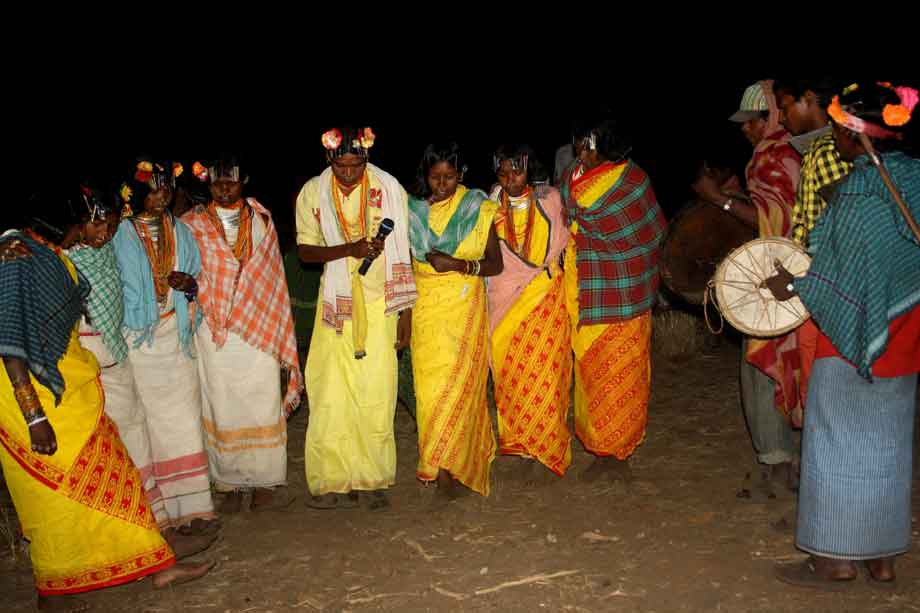
As I boarded the train to Muniguda, I felt something similar to a long felt desire being realized. I was heading towards the Niyamgiri hills- to meet with the people who had, despite all odds, managed to convince the reluctant government about upholding their rights over their hills, their forests, their rivers, their land and the minerals that lay underneath it and their god- their Niyam Raja who they worship.
While on the train, I recalled the story of Niyamgiri thus far- as much as I had been able to read and gather over the past few years from friends who have been associated with with the Nyamgiri Surakhya Samiti, the peoples movement in Niyamgiri.
Odisha literally means the land of farmers. How ironic, when the state is encouraging steel, aluminium and power companies to set up factories, promising them mines to extract iron ore, bauxite and coal despite large scale protests by local people and evidence that suggest massive environmental impact and loss to lives and livelihoods for the local farmers, labourers and forest dwelling communities. Companies like Vedanta, South Korean steel maker POSCO and their likes haven’t been able to proceed with their so called development agendas in the state and have not been able to procure mining leases, environment and forest clearances, and have failed in forcefully acquiring land from the communities who own them.
Vedanta also known as Sesa sterlite, has invested Rs.5,000 crore to set up an alumina refinery with a capacity of one million tonnes a year at Lanjigarh in Kalahandi district of Odisha. The refinery had plans to source bauxite from the Niyamgiri hills spread over Rayagada and Kalahandi districts of Odisha. Sourcing the bauxite from places further off, would mean lesser profits for the multibillion giant and would delay their plans for further expansion, to quickly increase production from one to five million tonnes a year. This project has ambitious plans to kill the hills spread over 250 sq km and destroy the lives and livelihoods of approximately over 8,000 people who have nurtured these forests and minerals underneath this land, which is now estimated to be about 70 million tonnes of bauxite.
The forest clearance for this project had been rejected following a directive of the Union Ministry of Environment and Forests in August 2010. The Odisha Mining Corporation had challenged this in the Supreme Court. Following this, the Supreme Court had ordered the state government to organise gram sabhas under the Forest Rights Act of 2006, to take a final decision on the issue based on the people’s opinion.
In 2013, palli sabhas (gram sabhas) were held in the beautiful hills of Niyamgiri between July and August of 2013, to decide whether the joint venture of state-run Odisha Mining Corporation and Vedanta Aluminium Ltd, should be allowed to go ahead with their bauxite mining extraction project. The district administration chose 12 of the total 112 villages that officially constitute the Niyamgiri hills for the gram sabhas, which were in the first phase of the anticipated core mining area. (Locals say there are many more small hamlets which don’t figure in the records).
The palli sabhas itself, were a classic example of state intimidation, in the name of democracy. The peace loving Dongria Kondh tribal communities, who have otherwise had limited interactions with the outside world, were now asked to come and make statements in public, in the presence of armed police personnel and district administration- people who were alien symbols of power in an outside world for them, only seen at times in the forests, when they would come and intimidate them and wrongly accuse them of supporting the naxals, from time to time.
The gram sabha resolutions unanimously voted against the project and vowed to protect their land and forests from vested interests. The message was loud and clear to the company and to the government. The final judgment in accordance with the law, had been made, following all due procedures.
The State government had been making atrocious claims that there will be no environmental impact and that the project would benefit locals! They went as far as to say that trees can be planted after mining, and hence the protest against mining was unjustified! The company made press statements that it is the duty of the state to provide it with the required raw materials to run the refinery. The Supreme Court verdict had done nothing to change their plans thus far. Meanwhile there were reports of the state government having assured the company 150 million tonnes of bauxite. This in itself should be treated as a gross contempt of court. However, what does one do when the state turns against the interests of its own people? When corporate money talks and when the state looks for ways to overlook its own laws and court rulings to please vested corporate interests?
The United Nations international guidelines on business and human rights seem to be a mockery in this context:
“States must protect against human rights abuse within their territory and/or jurisdiction by third parties, including business enterprises. This requires taking appropriate steps to prevent, investigate, punish and redress such abuse through effective policies, legislation, regulations and adjudication.
States should set out clearly the expectation that all business enterprises domiciled in their territory and/or jurisdiction respect human rights throughout their operations.”
With these thoughts playing in my mind, I reach Muniguda station. I notice a huge signboard at the entrance of the Muniguda railway station, advertising Vedanta/Sesa Sterlite’s corporate social responsibility initiatives. It’s nothing more than a joke. A corporate which is blatantly trying to destroy the local community’s lives and livelihoods says it is “helping farmers with commercial vegetable cultivation with fertilizer, seeds and training”. They go on to say their motto is ‘zero wastage, zero discharge and zero harm plant’, whatever that’s supposed to mean!
From Muniguda station, we head to Ijirupa village with members of the Niyamgiri Surakhya Samiti, a peoples movement who spearhead the fight against the threat to forced evictions of people from the Niyamgiri hills. I meet up with local activists, filmmakers and supporters of the movement who were all there to take part in the celebration. We reach Ijirupa village, from where our three hour uphill trek begins.
Every year, the people of Niyamgiri, gather on top of the hills to worship their Niyam Raja- i.e. their hills, forests, rivers and land. In this annual festival, the Kondha community comprising of the Dongria Kondh, Kutia Kondh and Jharania Kondh celebrate their relationship with their god- their Nyamgiri hills- their Niyam Raja. They vow to protect their forests which have an approximate density of a whopping 1,350 trees per acre, with a variety of more than 300 species of plants, including fifty known medicinal plants and possibly may more undiscovered ones. The opportunity to be a part of this celebration, filled me with an immense sense of gratitude. Gratitude to these powerful and amazing people, who made it possible for us to experience the rich natural heritage and beauty of this place, which had been painstakingly created and nurtured by them, over many generations spanning centuries.
As we reach the hill top, we are greeted by reverberating sounds of drums marking the beginning of the celebrations. These drums would continue to play for the next 24 hours, through the night and day!
The crowd slowly swells in number as people from the surrounding villages reach the centrally located hill top. In a vast open ground, children, men, women, elderly people have all come to camp together for 2 days and worship their beloved Niyam Raja. The community is gracious enough to have extended an open invitation to other outsiders, who are supporters of the movement.
Community contributions of rice, lentils, vegetables, firewood and goat meat all keep the cooking pot simmering and nobody leaves hungry. Huge screens are set up at midnight to watch films that have been made about their movement. The sense of jubilation, optimism and deep respect for NiyamRaja is infectious. I feel a deep sense of respect and love for these people and their forests.
As groups of people huddle together and light up a fire to keep themselves warm, I along with a friend, join in and seek to be accepted in one of the groups. They welcome us with no pretence of over friendliness. We smile, humbled and accept the space gratefully! That night was one I can never forget in my lifetime. To be a part of this event, which has such a deep connect with nature, while being so simple in its appearance is truly moving and can teach us city dwellers a lesson or two!
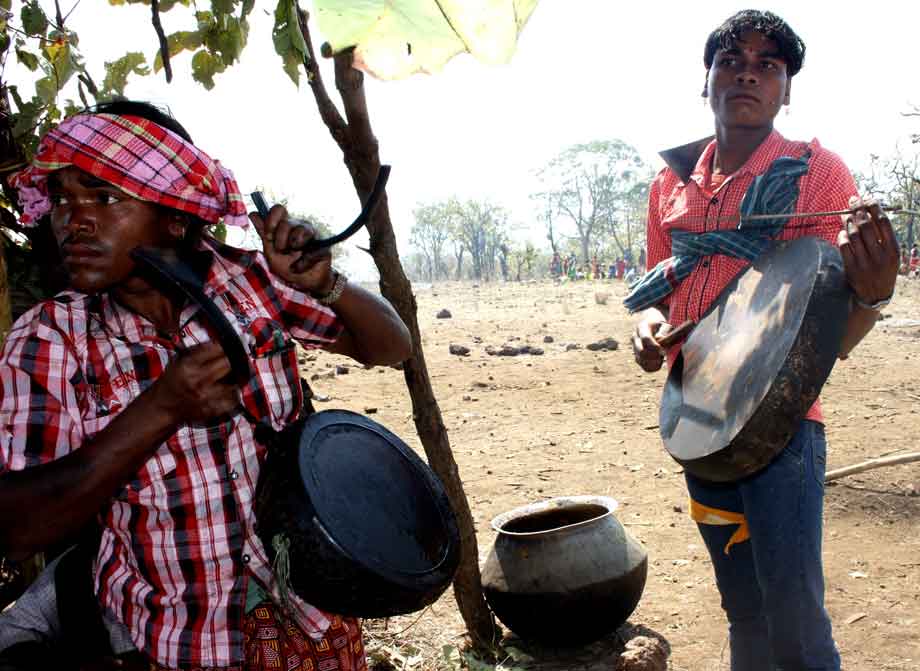
My friend Arundathi and I try our hand at the drums and jam with the expert Dadhi Pusika, one of the senior leaders of the movement. He cracks up and laughs uncontrollably, seeing us play. I came across an interview of Dadhi Pusika published earlier, by KBK TV https://www.youtube.com/watch?v=yAVWatMRKN0 where he talks about the struggle and threats to his life for standing up for his rights. I am thrilled to meet him in person and share a lighter moment with this iconic leader.
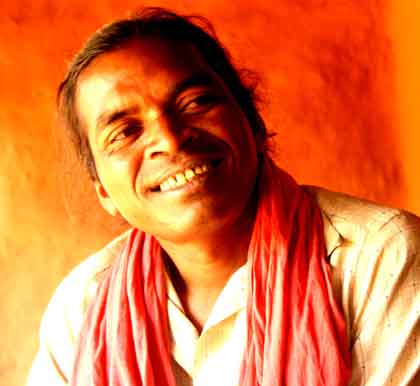 My activist friend and film maker Debaranjan Sarangi introduces me to Lado Sikaka, one of the other prominent leaders of the movement. I ask him if I can come with him to his village and spend a few days there. He readily agrees, saying if we can walk that distance, we are welcome. My friend and I are thrilled, to say the least. After the festivities are concluded and tributes paid to Niyam Raj, we head to Lakhpadar village with Lado Sikaka and other people from his village.
My activist friend and film maker Debaranjan Sarangi introduces me to Lado Sikaka, one of the other prominent leaders of the movement. I ask him if I can come with him to his village and spend a few days there. He readily agrees, saying if we can walk that distance, we are welcome. My friend and I are thrilled, to say the least. After the festivities are concluded and tributes paid to Niyam Raj, we head to Lakhpadar village with Lado Sikaka and other people from his village.
I came across a speech made earlier, by Lado Sikaka, which highlights his views on the mining project https://www.youtube.com/watch?v=ipHmVee_uXw Back in August 2010, while on his way to Delhi to address a gathering about the protest against the Vedanta mining project, Lado Sikaka had been kidnapped by plainclothes policemen who kept him by force, in the forests for four days and physically abused him. Lado says that they had accused him of having links with naxalites because he was opposing the mining project.
Lado is a very gentle and patient man. He answers all our questions and makes us feel at home. When I ask him about why he is accused of supporting naxalites, Lado couldn’t have answered more succinctly “ Whoever fights for their land or has a connection with the forests is a 'mahavaadi' (naxalite). So, this water- 'paani' is a 'mahavadi', this land- 'maati' is a 'mahavadi'. Everyone who loves their land is a mahavadi in the eyes of the state.” When asked if he fears being attacked again, Lado looks distantly at the hills and says. “I am here today, gone tomorrow. If not for me, others will be there to defend our Niyam Raja. The fight will never end”.
Lado then asks us to eat our dinner. Lado’s wife Sonari has made some lip smacking gravy cooked with the local Girul flower and tomatoes along with Kosla bhaat- a millet similar to rice, grown in this region. “Everything except the salt, is sourced from our land”, Lado tells us. We lick our plates clean, grateful for this exquisite meal.
We are assigned a house shared by a few unmarried women. I think its unique to have a space like this for young women. We sing and dance till late into the night with a few other women who join the party.
The next day we trek into the forests and explore the beauty of the hills a little more. I ask Lado if I can drink some Salaf, a toddy extracted from a locally grown palm tree. The women teach us how to ask for toddy in their language ‘Kui’. Lado climbs up the tree in a jiffy and gets us some of the fruity nectar.
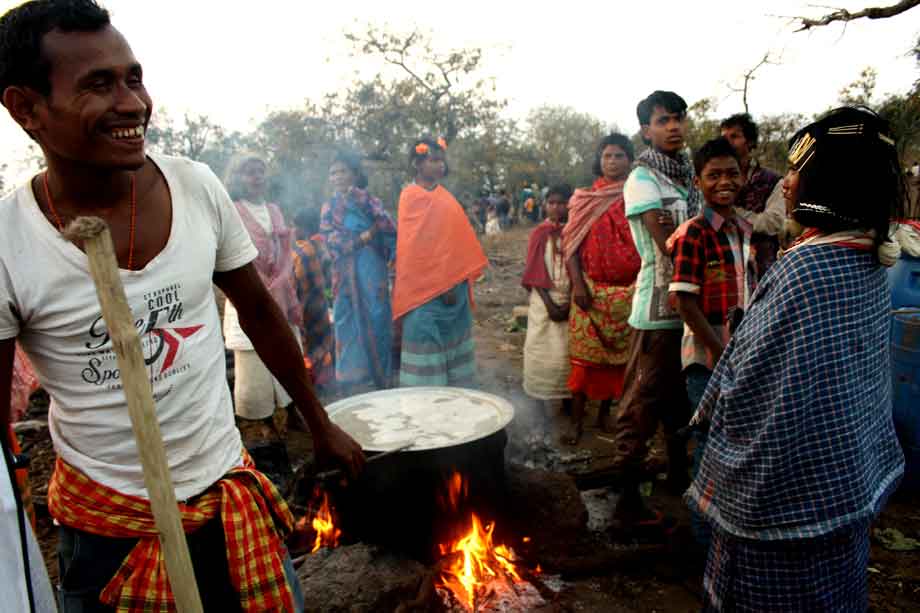
What a treat this is! We drink the salaf with glee, as Lado watches with amusement. Not a drop is spared. Lado goes on to tell us that they drink this in moderation these days and that we should do the same. We grin and ask for more sheepishly. We aren’t disappointed. No one ever can be, in this land, I guess. There’s enough and more for everyone. As Drinju, a young man actively involved in the movement said, “there’s enough in niyamgiri for everyone. Come, live with us, eat our food and sing with us. But what will we do, if you want to take our land away and kill us? We will have to fight you!” Drinju then goes on to pick up his mouth harp (made by him using a local grass) and plays it. Women in the neighbourhood join in. We are left transfixed, in that moment.
We try and learn some of the songs they sing. They are beautiful, all mostly about the beauty of their land and the magic it holds. They tell us they are not songs they learn to sing, but just gets passed on to their children. It’s an expression of themselves, of what they feel for their land. We understand and tell them so. It’s time to say good bye. We promise to return and to also tell the story of their lives to our friends and as many people we can reach out to, as they would like us to.
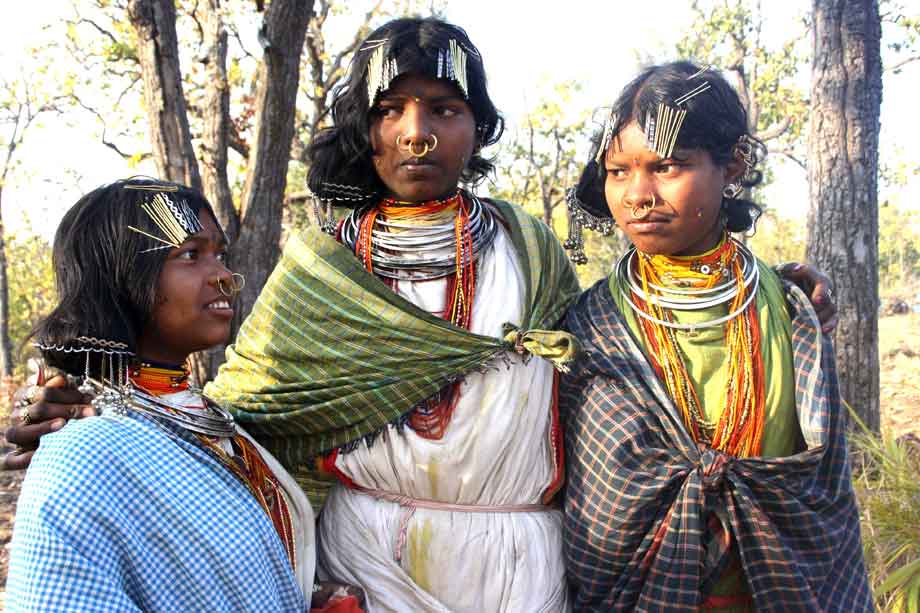
This song sung by the elders in the community, is a beautiful answer to what development means to the people of Niyamgiri. (Source: Down to Earth). This in effect is the message the people of Nyamgiri would like to give to the government, which is trying to dilute the laws that protect local communities’ interests over their land and forests. Are you listening, Mr. Prime Minister?
“Niyamraja created fruits in the hills, grains in the plains
He is the first of the Dongria Kondh
No one knows his story, lakhs of people are unaware
I will sing, I will sing why the outsiders must spare our land
After making pineapple, mango, jackfruit and grains
Niyamraja said to us ‘live on what I have given you’
Niyamraja decided where there would be fruits and grains
Which seed will be soft and which one would be hard
Niyamraja is crying today, the hills will turn into mud
The rocks will crumble and everyone will die
Will there be any rivers left if there are no streams?
Will there be any streams left if there are no hills?
How will everyone get to know of Niyamraja’s miracles?
If Niyamgiri will be not there, I will sing, I will sing
What will we do without the fruits, grains and buffaloes?
What will we do without Niyamgiri?
What will the animals do without the big forest?
What will we do without its plants that save lives?”
Lado representing his community as its leader would also like to ask the Prime Minister one all encompassing question: “If you are not able to look after the interests of 8000 people, how do we trust that you can do anything for the betterment of the entire country? Are we not a part of this land?”
As we head back to Muniguda township, we have a day to spend before we can take our train. While exploring the local market or weekly ‘haat’, we chat with some of the tribals who have come to sell their produce. A shady looking man tells me not to talk to the tribals- since they are not good people. I ask him to stop talking to me and that I think he is nasty, not them. Not long after this, a police jeep stops us in the middle of the road. The shady guy turns out to be a police informer. They ask us about the purpose of our visit. I say we are tourists. My love for food photography comes to my rescue. I show the police some food pictures on my phone camera, while I remove the memory card from my other camera which has pictures of the leaders from the movement, who are as mentioned before, like many other human rights defenders in this country targeted by the state for opposing the mining project-despite using constitutional and non violent means of protest!. I am quickly able to conceal the memory card inside my clothes. The police take down our details from our ID cards and tell us they need to have informed them before roaming around in town. We tell them they should make public announcements, if this indeed was the case. We also tell them that the police informer behaved inappropriately with us, by beckoning us in the middle of the market. They are convinced and let us go.
We are once again reminded of the goondaism that prevails in regions like these, where communities face threats of abuse, intimidation and forced eviction due to mining and other so called development projects; where human right defenders and activists who believe in and abide by the law are made to feel like criminals and where the rich corporates who violate the law, rule the land.
Shobha. R, Human Rights activist, Bangalore,
.
Comments are moderated

